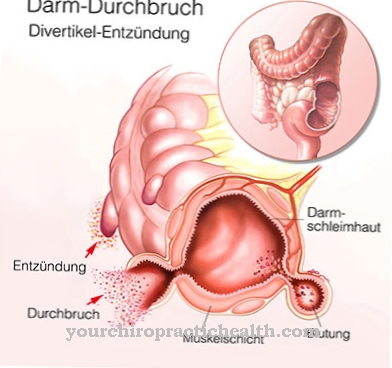The cognitive dysphasia is a language disorder. The cause are lesions in areas of attention, memory or executive function. Targeted speech therapy is used for treatment.
What is cognitive dysphasia?

© peterschreiber.media - stock.adobe.com
Language is a behavior. To speak, people don't just need their tongue and vocal cords. The intactness of the neuromuscular language structures is a prerequisite for speaking, but it is by no means the only one. In order to be able to speak, humans also need mental functions, for example, in order to control their behavior while taking environmental conditions into account.
This bundle of cognitive skills is known as cognitive control. In this context, the ability to pay attention is also relevant. Only those who pay close attention to their environment can respond appropriately to them. In addition, memory plays an important role for every type of linguistic expression, especially language or meaning memory.
If one of the functions described is impaired, so is speech behavior. People with dysphasia suffer from a reduction in the ability to speak, which corresponds to mild aphasia. The concept of cognitive dysphasia goes back to Heidler. It was first described in 2006. This type of aphasia is a language processing disorder that is associated with impaired attention, memory and executive function and often leads to incomprehensibility in speech.
However, a patient with dysphasia does not always have to be completely unable to express themselves. Cognitive dysphasia is a symptom of lesions in the central nervous system. Typically, the condition is caused by focal lesions in areas of the brain that are relevant to speech memory, attention, or executive functions.
causes
The primary cause of cerebral dysphasia lesions can vary in nature. Dysphasia is particularly often the symptom of a stroke and, as part of this, is due to a disruption of the cerebral blood supply. With such a disorder, nerve tissue in the area of the brain perishes, so that there is a complete or partial loss of functions in the affected areas.
Cognitive dysphasia can also occur in the context of accidents, especially in connection with cerebral haemorrhage. Cerebral haemorrhages often cause intracranial pressure to rise alarmingly. As a result, the brain is compressed. Malfunctions in the affected areas are the result. In addition to strokes and bleeding, cerebral inflammation, tumors or degenerative diseases can also promote dysphasia.
In connection with inflammation, a bacterial cause is just as possible as an autoimmunological cause. Areas for attention are mainly in the reticular formation of the brain stem, thalamus and frontal lobe. General alertness is in the right hemisphere. The left half of the brain is home to specific concentration activities.
Memory functions are mainly in the limbic system of the hippocampus and the tonsils. In addition, the frontal lobe and the long-term memory regions in the left hemisphere are relevant as word stores. The episode memory is in the right half. The linguistic-logical thinking, planning and initiating lies in the frontal lobe and its connections to other areas.
Depending on the symptoms in the individual case, there are different types of cognitive dysphasia. One type of dysphasia is impaired attention, which results in a slowdown in information processing. Speech processing is delayed and the flow of speech seems slow. Inconsistencies in coherence occur in the utterances.
Symptoms, ailments & signs
A cognitive dysphasia manifests itself primarily through the characteristic language disorders. Those affected often have sluggish or unclear language, swallow syllables and have difficulty finding words. Furthermore, cognitive dysphasia can cause serious emotional complaints.
The language disorders represent a psychological burden from which long-term secondary illnesses such as depressive moods, social phobias or inferiority complexes can develop. In severe cases, cognitive dysphasia or the underlying condition lead to severe depression. The language disorder usually comes on suddenly.
After a stroke, the changed way of speaking can be noticed immediately. The symptoms usually worsen in the first few days or weeks. If the cause of the disorder is treated competently at an early stage, the extent of the dysphasia can be alleviated. However, most patients suffer from persistent language disorders and the resulting consequences for life.
If the condition is not treated, serious complications can develop. In addition to the psychological complaints that are noticeable in the majority of patients, the language problems may intensify. Depending on the cause, further physical and mental limitations and illnesses can occur.
Attention selection disorders, on the other hand, lead to symptoms such as irrelevant verbal activity, as they interfere with the filtering of information. With this variant, speech is barely perceived under noise conditions, as the filter is also overwhelmed by ambient noise. The variant of memory dysphasia are language system disorders that make it difficult to acquire new knowledge in general.
Common symptoms in this case are impoverishment of linguistic expression, confabulation, spontaneous inventions and language comprehension problems. Cognitive dysphasia due to impaired executive functions leads to language impulse disorders, language inhibition or inhibition, association currents, wrong choice of words and word salad.
Particularly severe cognitive dysphasias are often associated with an orientation disorder and manifest themselves in confused, confabulatory utterances and a reduced understanding of language.
Diagnosis & course
Dysphasia is recorded using Heidler's screening. The screening corresponds to an attention and memory diagnosis that checks the executive functions by means of verbal and non-verbal information processing.
Attention and memory are also tested through visual recognition of the image of objects and verbal reproduction of narrative texts. In addition to the screening, neurological diagnostics are carried out, which should primarily identify the primary cause of the dysphasia using imaging.
When should you go to the doctor?
In any case, a doctor must be consulted with speech disorders. Depending on the severity of the symptoms, the family doctor or a speech therapist or neurologist can be consulted first. The person concerned should seek medical advice if the speech disorders appear to appear for no reason and persist after a week. It may be due to an untreated stroke or there is an autoimmunological cause that needs to be clarified. The risk groups also include people who have already had cancer or cerebral inflammation.
People with degenerative diseases should also have the symptoms clarified quickly. Children should be brought to the pediatrician if they have the symptoms mentioned. In any case, cognitive dysphlasia must be clarified by a doctor in order to rule out complications and to ensure rapid recovery. Continuous medical supervision is necessary during treatment. In addition, the medication must be regularly adjusted to the patient's current state of health. Other contacts are the neurologist or a specialist in speech disorders.
Treatment & Therapy
Cognitive dysphasia is treated by a neuropsychologist who specializes in training attention, memory, and executive function. Because of the few neuropsychologists in the branch, the patients are alternatively referred to a speech therapist who carries out a specially cognitively oriented speech therapy.
The treatment must be specific to the disorder and is thus precisely geared towards the cognitive functions that have been damaged. The patient's speech processing should be improved to such an extent that it hardly interferes with his everyday life. The top priority of the treatment is the creation of a sufficient level of activity, as can be achieved through training of executive functions, selective attention, attention focusing and mental adaptability.
Therapy is often lengthy and difficult, as the patient's ability to learn is limited in the case of severe brain damage. In addition to treating the symptom, treating the primary cause is also provided, as far as possible. Inflammation in the brain must be reduced with cortisone or antibiotics. If necessary, increased intracranial pressure is surgically lowered and tumors are removed surgically.
Since the central nervous system is not particularly capable of regeneration due to its specialization, brain lesions are often associated with permanent damage. A complete restoration of the functions in the affected tissues can only be achieved if the individual functions can be transferred to the surrounding nerve tissue through targeted training.
You can find your medication here
➔ Medicines to improve concentration and language skillsOutlook & forecast
The prognosis of cognitive dysphasia depends on the extent of the damage and the underlying disease. For a large number of patients, improvements can be achieved through the use of targeted language training. However, complete healing does not always occur.
After a stroke, irreparable tissue damage in the brain is found to be the cause of the speech disorder. The greater the extent of the damaged areas of the brain, the less likely it is that natural language skills will be restored before the triggering event. If only a small area of the brain is damaged by a stroke or a cerebral haemorrhage, the person affected can regain their language skills with a lot of discipline and cooperation in therapy.
In the case of a tumor, the prognosis depends on the type of tumor, its size and the possibility of complete removal of the mutated tissue. The more aggressive and the larger the tumor, the worse the prognosis. There is a possibility that the tumor could grow to an extent that would lead to a sharp increase in symptoms and ultimately to the premature death of the person affected. If the tumor cannot be removed, the prognosis is poor in most cases. There is also the risk that further illnesses develop due to the psychological stress of possible further tissue damage.
prevention
Cognitive dysphasia can only be prevented to the extent that strokes, cerebral inflammation, degenerative diseases of the brain, brain tumors, bleeding and trauma can be prevented.
Aftercare
Follow-up medical examinations diagnose the extent of the damage and impairment caused by cognitive dysphasia. The appropriate therapeutic measures are then derived from this. Speech therapy is geared towards the resources and skills in language and communication. Medical and speech therapy treatment will be based on common goals.
An early start will contribute significantly to maintaining the language and communication skills. In addition, the improvement in the patient's linguistic performance means that his cognitive performance does not deteriorate. In addition, strategies are shown with which the patient can correct the word-finding disorders. Participation in community life is thus preserved. During aftercare, the involvement of the relatives with regard to the impaired communication with the patient is an important part of the therapy.
The duration of treatment is based on the success of the treatment and the needs and social environment of the patient. If objectives have been achieved and there is no further therapeutic approach that could lead to improvements for the time being, the treatment is not continued. If necessary, a new follow-up examination by the specialist or the speech therapist may be necessary at a later point in time.

.jpg)
.jpg)
.jpg)


.jpg)




















